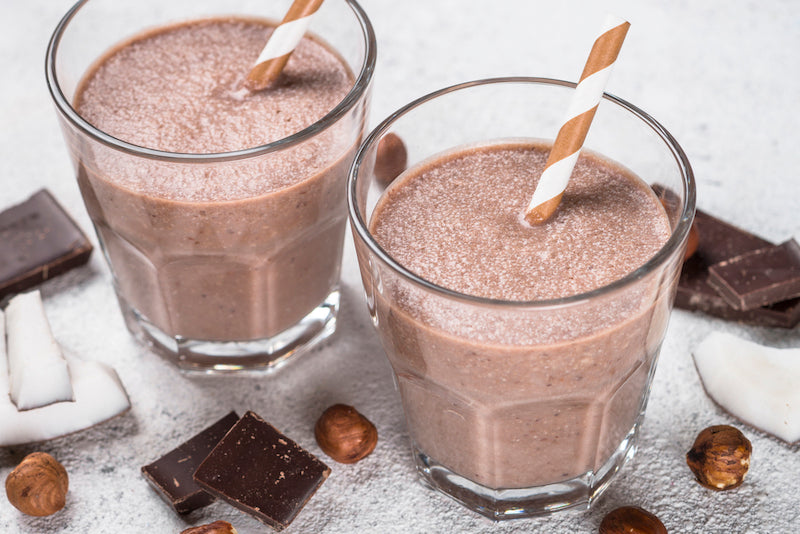Whey protein is one of the most popularly used supplements among many people, from fitness enthusiasts to people who just want to increase their protein intake.
Whey protein is used for a variety of reasons, including building muscle, weight gain or weight loss, or simply improving overall health and wellness.
You may be wondering when is the best time for whey protein. Keep learning to read when you should consume your whey protein supplement based on your health goals.
When is the Best Time for Whey Protein
Build Muscle
Protein and the amino acids in them are essential for muscle protein synthesis (a fancy term for building muscle).
If your goal is to increase muscle size and strength, you need to consume more whey protein than your body breaks down naturally during resistance training or weight lifting.
The optimal time to consume whey protein for muscle protein synthesis is a widely-debated topic.
Research on Whey Protein and Muscle Growth
Gym Goers often suggest taking a whey protein concentrate or supplement 30–60 minutes after exercise. This is said to be the perfect time for getting the most out of a whey protein supplement and is often called the “anabolic window.”
The latest research suggests that the “anabolic window” may be much wider than 60 minutes.
The International Society of Sports Nutrition recommends taking whey protein up to two hours after your workout to best support muscle growth.
Most people looking to build muscle don't need to worry about the timing of protein or amino acids intake if they are consistently doing resistance training and consuming enough protein.
However, for certain types of athletes like bodybuilders, nutrient timing may be more important for optimal muscle protein synthesis.
If you train in a fasted state (like before eating breakfast), taking whey protein immediately after a workout may be beneficial because you haven't consumed any protein since before bedtime.
Best Whey Protein Time for Preserving Muscle

Preserving muscle mass is especially important as you age. Studies show that people lose about 3–8% of their muscle mass each decade after age 30.
Muscle loss is associated with a higher risk of fractures and premature death.
Experts suggest that spreading whey protein intake evenly throughout the day is the best way to preserve muscle mass. To prevent muscle loss, eat 25–30 grams of protein per meal.
If you have difficulty consuming this much protein, a whey protein supplement can help you increase your protein intake.
Try adding a whey protein supplement at breakfast or with snacks between meals.
Whey Protein for Post-Workout Recovery
Many athletes take whey protein to improve performance and enhance post-workout muscle recovery.
Endurance athletes should combine whey protein with a carb source during and after exercise. This may improve performance and reduce muscle soreness.
Whey Protein Shake Before Resistance Exercise
Whey protein can improve both performance and recovery in strength training with all nine essential amino acids (including all three branched-chain amino acids), regardless of whether it's consumed with carbs.
For most people, getting enough protein and amino acids is more important than when they consume it. However, strength and resistance training athletes should take whey protein either immediately before or after a workout.
Whey Protein Shake for Weight Management

Protein is an incredibly helpful nutrient for fat loss. Consuming a high-protein diet may promote increased metabolism, control appetite, and promote an optimal body weight.
Protein helps weight loss by reducing your appetite by lowering levels of the hunger hormone ghrelin, and increasing levels of appetite-reducing hormones like glucagon-like peptide-1 (GLP-1), peptide YY (PYY), and cholecystokinin (CCK).
Eating a high-protein snack between meals may increase feelings of fullness, decrease your overall caloric intake for the day, and help you reach your weight loss goals faster.
Protein Shake for Calorie Management
A study found that people who ate a high-protein snack in the afternoon ate fewer calories at dinner, compared to those who ate a carb-based snack without protein.
The snacks all provided the same number of calories, however, the snack eaten by participants who consumed fewer calories at dinner contained more protein.
To promote optimal body weight, eat plenty of protein-rich foods (like a protein shake) throughout the day.
Not only for optimal weight, but also to make sure you get adequate amounts of amino acids needed for muscle growth and recovery.
Take whey protein shake as a snack between meals to curb hunger and reduce caloric intake later in the day to support healthy weight loss.
Whey Protein for General Health and Well-being

Adequate protein intake is essential for general health and well-being.
Dietary protein serves many functions in your body. It helps repair and build tissues, drives metabolic reactions, regulates pH and fluid balance, and supports a strong immune system.
It also transports and stores nutrients and can act as an energy source.
The daily recommended intake of protein for healthy adults is 10% to 35% of your total calorie needs.
A person who consumes a 2000-calorie diet could eat 100 grams of protein, or 400 calories from protein, which would supply 20% of their total daily calories.
For general health and well-being, a whey protein supplement can be taken at any time to fulfill your daily protein needs.
Is it OK to Drink a Whey Protein Shake at Night?
Whether your goals are to build muscle, increase strength, improve exercise performance, or enhance recovery, you can benefit from taking whey protein supplements before bed.
Researchers have found that taking protein before bed can promote muscle growth and recovery. It can also be helpful for older adults who wish to preserve muscle mass.
This is because protein taken before bed is completely digested and absorbed, which increases the availability of protein to muscles for recovery during the night.
While you have the option to take a number of protein supplements before bed, you may consider taking a casein protein supplement instead.
Casein is more slowly digested and absorbed, which provides the body with a steady supply of protein throughout the night.

How Much Whey Protein Per Day
Whey protein supplements should be used to add to the protein you're consuming from your diet, not replace it.
Whey protein supplements are easy to add to your diet. It comes in a powder that can be added to smoothies or yogurts, or simply mixed with water or milk.
Common dosages range from 25-50 grams per day (1-2 scoops), especially for muscle growth, but some products will include other suggested serving sizes on the labeling.
Keep in mind that you shouldn't take whey protein beyond your recommended amount. Consuming too much protein may cause digestive problems, including:
-
nausea
-
pain
-
bloating
-
cramping
-
flatulence
-
diarrhea
Whey protein supplements are well tolerated by most people when consumed in moderation.
Whey Protein Isolate vs Concentrate: Which Should I Pick?

There are two common forms and types of whey protein used: whey isolate and whey protein concentrate.
Whey isolate undergoes different processing than other types of whey protein concentrate, which makes the isolate higher in protein with fewer carbs and fat per serving.
The nutritional differences between whey isolate and whey concentrate are small, and there is little evidence that suggests one is better than the other.
Whey isolate may be a good choice for people who want to limit their fat and carb intake. It may also be a better choice for people who are lactose intolerant.
Both types of whey are gluten-free.
Regardless of which kind you use, whey is a high-quality complete protein that can help you reach your daily protein intake goals.







